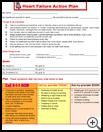
Heart Failure: Weight Monitoring
________________________________________________________________________
KEY POINTS
- When your body has too much water and salt, or if you are overweight, your heart has to work harder.
- To help prevent problems when you have heart failure, you need to check your weight every day.
- To keep fluid from building up, you may need to limit salt and limit how much liquid you drink.
- To keep a healthy weight, it helps to eat a healthy diet and follow the exercise program recommended by your healthcare provider.
________________________________________________________________________
What is heart failure?
Heart failure (HF) means the heart is not pumping blood as well as it should, and not enough blood flows out of the heart to the body. When this happens, muscles and other tissues may not get enough oxygen, and the kidneys may not work as well to remove excess fluid in the form of urine.
Why do I need to check my weight?
When your body has too much water and salt, it increases the amount of fluid in your blood. Your heart has to work harder to push this increased amount around your body. The extra fluid may be pushed into your lungs, making it harder to breathe. The fluid may go into your belly making it harder to eat and digest food. Or the fluid may collect in your lower legs, which can cause swelling and pain. Also, if you are overweight, your heart has to work harder to allow you to do everyday activities.
To help prevent problems when you have heart failure, you need to check your weight every day. By keeping a healthy weight and the right balance of water and salt in your body, you will:
- Help your heart so it doesn’t have to work as hard
- Help your heart pump blood better
- Feel better
How should I check my weight?
- Weigh yourself every morning after you use the bathroom but before you eat or drink anything.
- Use the same scale every day. Ask your healthcare provider if you should use a certain kind of scale.
- Wear similar clothing each time you weigh yourself.
- Keep track of your daily weight in a diary, on a calendar, or in a tracking app.
- Call your healthcare provider if you have a sudden increase of 2 pounds in 1 day, 3 pounds in 2 days, or 5 pounds in a week. Letting your provider know about weight gain when it first happens can save you a trip to the emergency room or a stay in the hospital.
How do I limit fluids?
- Follow your healthcare provider's advice on how much liquid you should drink each day. You may need to restrict your fluids to no more than 64 ounces (8 cups) every 24 hours.
- Keep track of the amount of liquids you drink or eat every day in a diary, on a calendar, or in a tracking app. Some foods count as fluids. These include pudding, soups, Popsicles, and gelatin such as Jell-O.
- Being thirsty does not mean your body needs more fluid. Avoiding salt helps you not feel so thirsty. Diuretics (water pills) help your body get rid of extra fluid. Be careful NOT to replace that extra fluid if your provider has told you to limit how much you drink.
It helps if you:
- Use small cups instead of mugs.
- Try to spread your daily allowance over the whole day.
- Try drinking very cold or very hot fluids - it takes longer.
To help when you are thirsty:
- Suck on ice chips.
- Limit how much alcohol you drink.
- Use lemon and glycerine mouth swab sticks.
- Suck on hard candy or chew sugarless gum.
- Eat small amounts of frozen berries or grapes.
- Add lemon juice to your tea or mineral water.
- Use lip balm or lip moisturizer.
How do I lower the amount of salt in my diet?
- Eat more whole foods like fresh fruits and vegetables, which have very little sodium.
- Read the labels on all canned, packaged, or frozen foods to see how much sodium they contain. Most soups, frozen dinners, lunch meats, flavored potato, rice and noodle mixes, and other processed foods have a lot of sodium. Be aware that food labels list sodium rather than salt content and the amount is always given in milligrams (mg). Foods that have less than 140 mg sodium per serving are considered to be low in salt.
- Check the sodium content in snack foods, even things that don’t taste salty.
- Use little or no salt when you prepare food. Try flavoring your food with herb and spice mixes or salt substitutes that do not contain sodium. Avoid seasoning mixes that may have salt in them, such as lemon pepper, Cajun seasoning, and blackening spices.
- Be careful about using salt substitutes. Many contain high levels of potassium. Salt substitutes may raise the potassium levels too much, especially if you take diuretics (water pills).
- Do not add salt to food at the table.
- Don't use a lot of sauces or condiments such as ketchup on foods.
After you have been on a low-sodium diet for a while, you may notice that your sense of taste for salt changes. For most people, this takes about 30 days, so it is important to stick with it.

